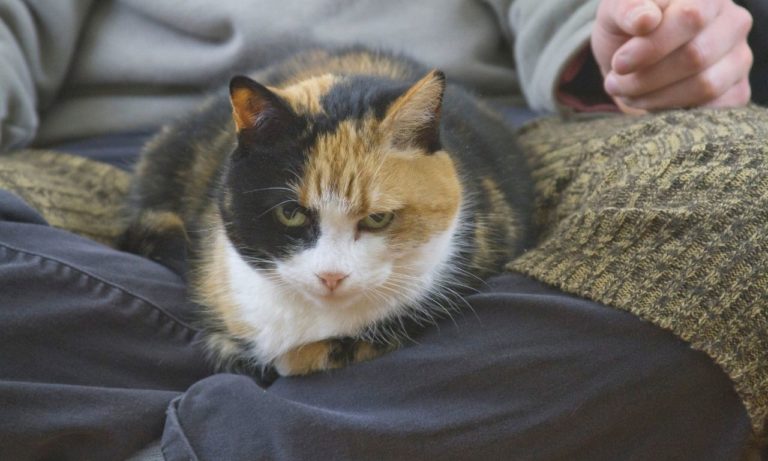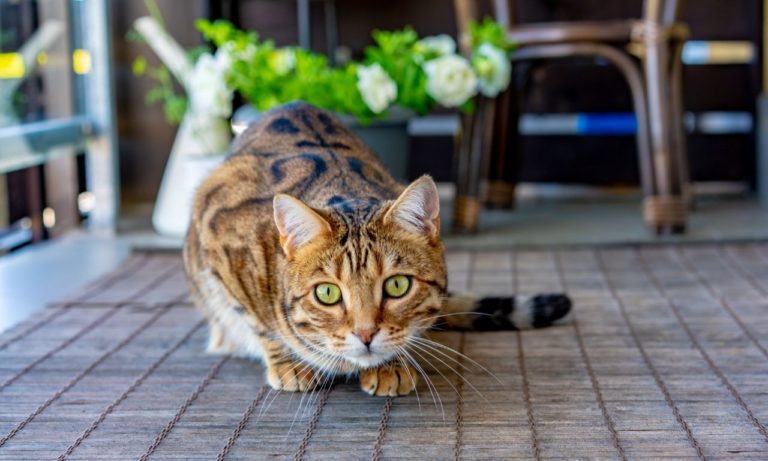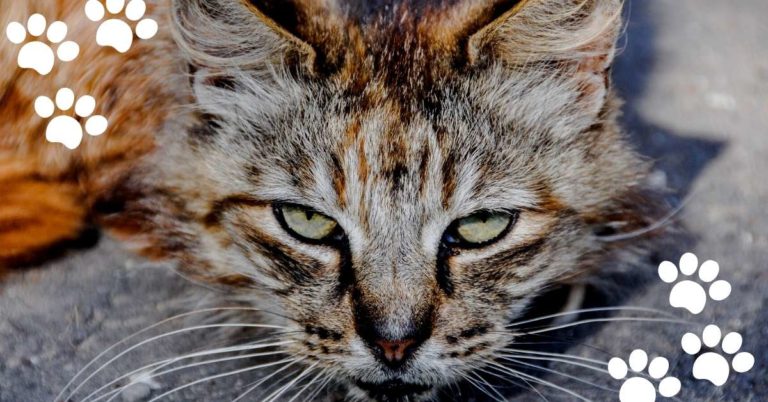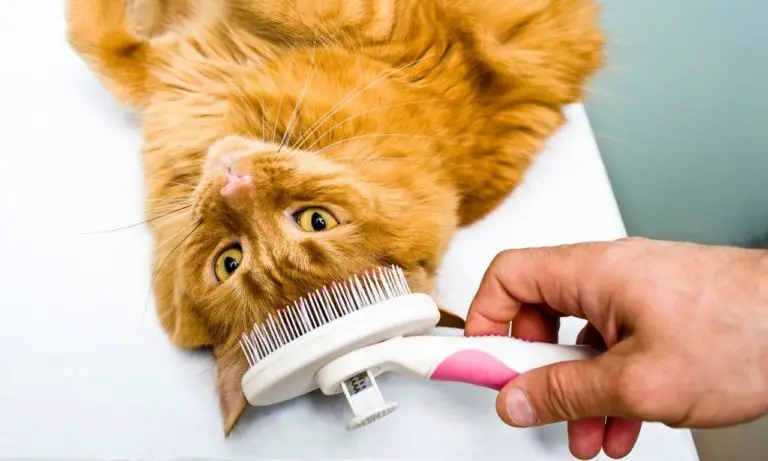Why Do Cats Shake Their Heads When Eating?
Most of the time cats shake their heads when they are eating because they are trying to get the food off their whiskers.
Whiskers are very sensitive and long, so when they brush against something, it feels really weird for them. Shaking their head gets the food off of their whiskers and makes it easier for them to eat.
If you’re wondering why your cat shakes their head when they eat, or whether it’s typical for your cats, keep reading. I’ll look at a number of reasons for this behavior and whether you should be concerned about your cat’s health if they do it in this blog post.
What are Whiskers and What Do They Do for Cats?
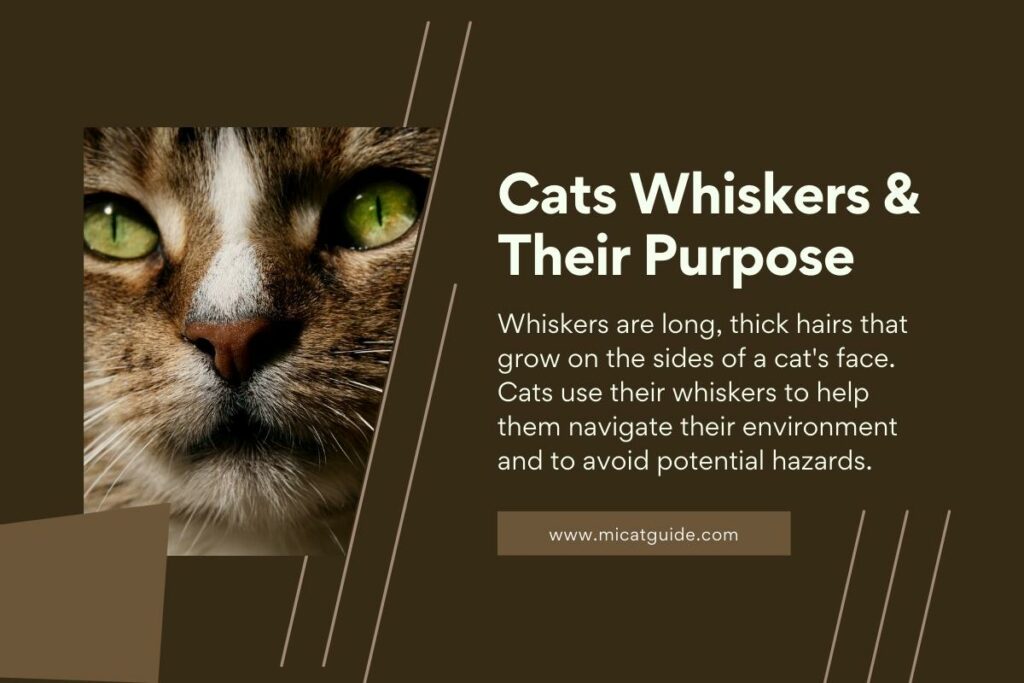
Cats have whiskers on their face, chin, and back of their front legs. The technical term for these structures is vibrissae. Vibrissae are actually hairs that are deeply embedded in the cat’s skin and are innervated by a large concentration of nerves.
This arrangement allows cats to detect even very small changes in airflow and use this information, along with input from other sensory modalities, to navigate their environment, assess potential prey, and avoid becoming someone else’s meal.
Interestingly, whiskers also help cats keep clean. They deposit oils from the sebaceous glands onto the fur as they groom themselves and these oils spread outwards from the whisker follicles, coating and protecting the rest of the fur.
Finally, whiskers can convey important information about a cat’s emotional state. They lay flat when a cat is relaxed but stand up straight (and sometimes even quiver) when a cat is feeling threatened or otherwise on edge.
5 Possible Reasons Why Cats Shake Their Heads When Eating
While you may think that your cat is simply getting food all over her face when she vigorously shakes her head when eating, there’s actually a bit more to it than that. In fact, there are several reasons why cats shake their heads when eating.
Here I’ll explore five possible reasons for the behavior.
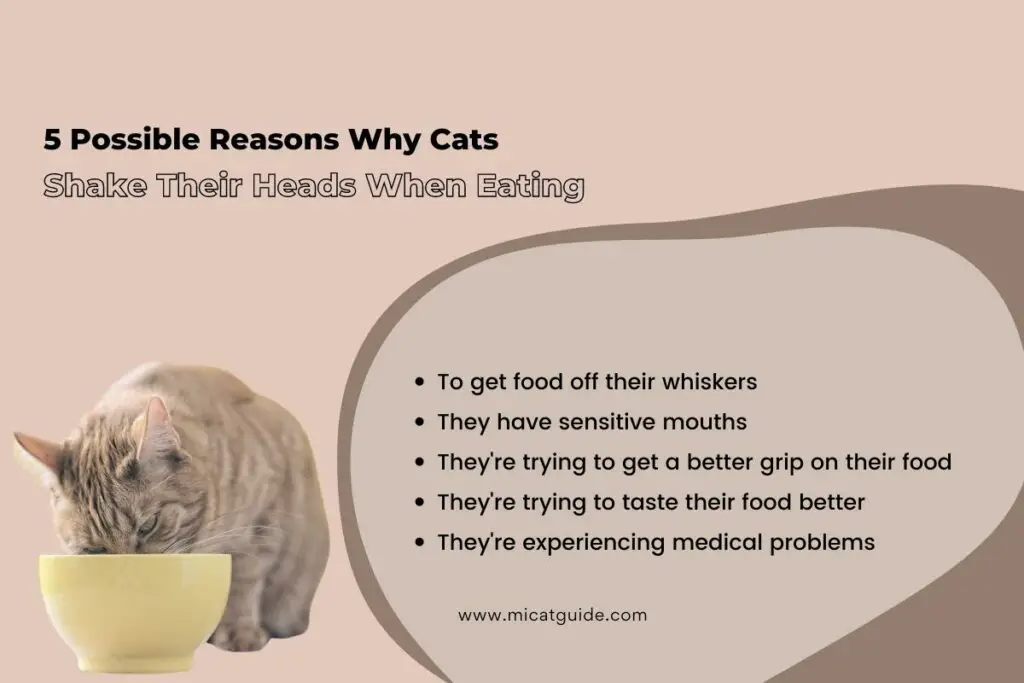
1. To get food off their whiskers
As I said earlier this is the most common reasons and the story behind that cats have whiskers on their faces (and bodies) that are extremely sensitive. As a result, when food or water touches them, it can trigger a reflexive response in your cat that causes her to shake her head.
According to veterinary behaviorist Dr. Stephanie Borns-Weil, this whisker sensitivity is hardwired into cats and is intended to help them survive in the wild. She explains that when a cat’s whiskers touch something, it can trigger a predatory response that causes the cat to attack.
In other words, your cat’s brain is designed to interpret the sensation of her whiskers touching something as a potential threat. As a result, she may shake her head in an attempt to get rid of the offending substance (i.e., the food) and avoid attacking it.
2. They have sensitive mouths
In addition to having sensitive whiskers, cats also have sensitive mouths. In fact, their mouths are lined with hundreds of tiny little receptors that help them detect temperature, taste, and texture.
Some cats are more sensitive to certain textures than others. For example, my cat is particularly sensitive to crunchy foods. If I give her a treat that is too crunchy, she’ll shake her head as she eats it in an attempt to break it down into smaller pieces.
Other cats may be sensitive to the temperature of their food. If it’s too cold or too hot, they may shake their head as they eat in an attempt to get rid of the temperature sensation.
3. They’re trying to get a better grip on their food
Cats use their whiskers not only to detect their surroundings but also to help them gauge the size of an object. This information is then used to help them determine how to best grasp the object with their mouths.
If your cat is having trouble getting a good grip on her food, she may shake her head as she eats in an attempt to get a better hold on it.
4. They’re trying to taste their food better
Cats have a highly developed sense of smell and they use this sense not only to detect their surroundings but also to help them identify potential prey. In fact, research has shown that cats have a region in their brains that is devoted entirely to processing smells.
However, cats also use their sense of smell to help them taste their food. When they sniff their food, they are actually taking in tiny particles of the food through their noses. These particles then stimulate the taste receptors in their mouths, giving them a more accurate picture of what they’re about to eat.
If your cat is having trouble smelling her food, she may shake her head as she eats in an attempt to get a better whiff of it.
5. They’re experiencing medical problems
While the above reasons are all perfectly normal feline behaviors, there’s also a possibility that your cat is shaking her head while eating because she’s experiencing medical problems.
For example, if your cat has an ear infection, she may shake her head while eating in an attempt to get rid of the pain. Other common medical conditions that can cause a cat to shake her head include: allergies, sinus infections, tooth decay, and gum disease.
If you’re concerned that your cat may be shaking her head because of a medical condition, it’s always best to consult with your veterinarian. They will be able to determine if there is an underlying medical problem and provide you with the appropriate treatment.
Is it Normal for Cats to Shake Their Heads when Eating?

Veterinarians often see cats who are shaking their heads and wonder if this is normal behavior. The simple answer is that, yes, it is normal for cats to shake their heads when eating. However, there are a few things to keep in mind.
First, head shaking can be a sign of an ear infection or another ear problem. If your cat is shaking her head frequently or seems to be in pain, she should see a veterinarian.
Second, head shaking can also be a sign of an upper respiratory infection or another condition that is causing inflammation in the nose or throat. If your cat is sneezing and has a runny nose in addition to head shaking, she should see a veterinarian.
Finally, some cats simply enjoy the sensation of shaking their heads and do it for no particular reason. If your cat’s head shaking isn’t accompanied by any other signs of illness and she seems happy and healthy otherwise, there’s no need for concern.
Do All Cats Shake Their Heads When Eating?
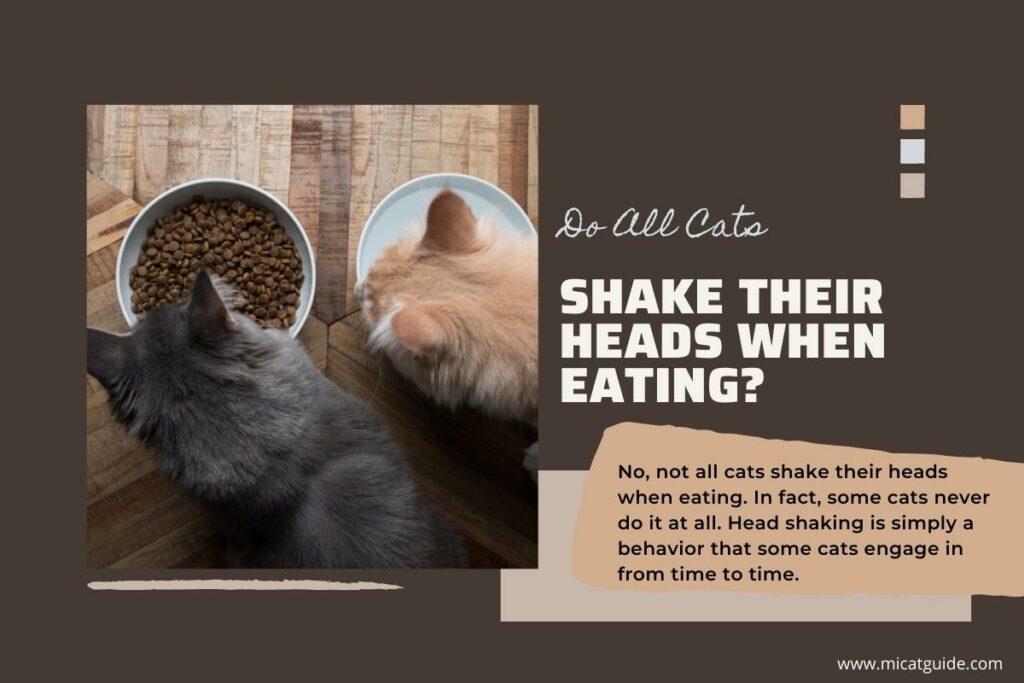
No, not all cats shake their heads when eating. In fact, some cats never do it at all. Head shaking is simply a behavior that some cats engage in from time to time.
If your cat does shake her head when eating, there’s no need for concern unless she also shows other signs of illness. If she seems happy and healthy otherwise, it’s likely that she’s just shaking her head to get a better grip on her food or to taste it better.
Of course, if you’re ever concerned about your cat’s health, it’s always best to consult with a veterinarian. They will be able to determine if there is an underlying medical condition and provide you with the appropriate treatment.
Why Some Cats Shake Their Heads More Than Others?
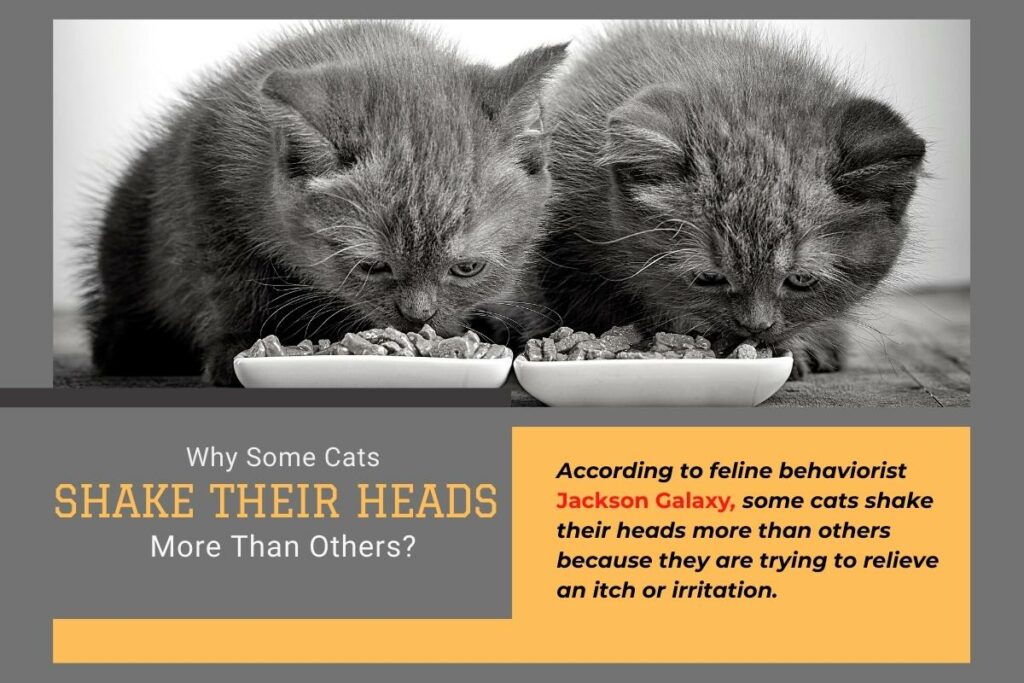
You may seen some cats shake their heads more than others when they’re eating. This is because some cats are just more prone to shaking their heads while they eat.
This might be due to the fact that they produce more saliva when they chew their food, or it could be because they’re more easily distracted when they’re eating.
Besides according to feline behaviorist Jackson Galaxy, some cats shake their heads more than others because they are trying to relieve an itch or irritation.
“Cats have very sensitive faces, and even a small amount of irritation can be enough to make them want to scratch,” he explains. “Shaking their head is one way that cats try to relieve the itch.”
Jackson Galaxy
If your cat is shaking her head more than usual, it’s always best to consult with a veterinarian to rule out any possible medical conditions.
My Final Thoughts
Cats head twitching or shaking when eating is a perfectly normal behavior. In most cases, it’s simply a way for them to get a better grip on their food or to taste it better.
However, if your cat is also showing other signs of illness, such as sneezing, a runny nose, or pain, it’s best to consult with a veterinarian. They will be able to determine if there is an underlying medical condition and provide you with the appropriate treatment.
Do you have a cat that shakes its head when eating? Let me know in the comments below!


